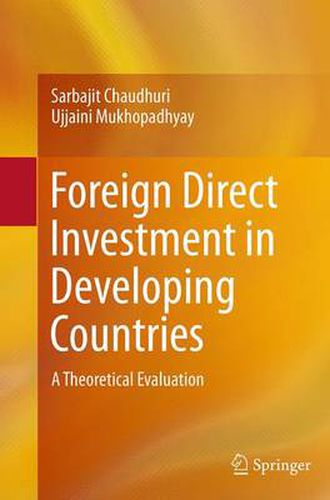Readings Newsletter
Become a Readings Member to make your shopping experience even easier.
Sign in or sign up for free!
You’re not far away from qualifying for FREE standard shipping within Australia
You’ve qualified for FREE standard shipping within Australia
The cart is loading…






This title is printed to order. This book may have been self-published. If so, we cannot guarantee the quality of the content. In the main most books will have gone through the editing process however some may not. We therefore suggest that you be aware of this before ordering this book. If in doubt check either the author or publisher’s details as we are unable to accept any returns unless they are faulty. Please contact us if you have any questions.
In development literature Foreign Direct Investment (FDI) is traditionally considered to be instrumental for the economic growth of all countries, particularly the developing ones. It acts as a panacea for breaking out of the vicious circle of low savings/low income and facilitates the import of capital goods and advanced technical knowhow. This book delves into the complex interaction of FDI with diverse factors. While FDI affects the efficiency of domestic producers through technological diffusion and spill-over effects, it also impinges on the labor market, affecting unemployment levels, human capital formation, wages (and wage inequality) and poverty; furthermore, it has important implications for socio-economic issues such as child labor, agricultural disputes over Special Economic Zones (SEZ) and environmental pollution. The empirical evidence with regard to most of the effects of FDI is highly mixed and reflects the fact that there are a number of mechanisms involved that interact with each other to produce opposing results. The book highlights the theoretical underpinnings behind the inherent contradictions and shows that the final outcome depends on a number of country-specific factors such as the nature of non-traded goods, factor endowments, technological and institutional factors. Thus, though not exhaustive, the book integrates FDI within most of the existing economic systems in order to define its much-debated role in developing economies. A theoretical analysis of the different facets of FDI as proposed in the book is thus indispensable, especially for the formulation of appropriate policies for foreign capital.
$9.00 standard shipping within Australia
FREE standard shipping within Australia for orders over $100.00
Express & International shipping calculated at checkout
This title is printed to order. This book may have been self-published. If so, we cannot guarantee the quality of the content. In the main most books will have gone through the editing process however some may not. We therefore suggest that you be aware of this before ordering this book. If in doubt check either the author or publisher’s details as we are unable to accept any returns unless they are faulty. Please contact us if you have any questions.
In development literature Foreign Direct Investment (FDI) is traditionally considered to be instrumental for the economic growth of all countries, particularly the developing ones. It acts as a panacea for breaking out of the vicious circle of low savings/low income and facilitates the import of capital goods and advanced technical knowhow. This book delves into the complex interaction of FDI with diverse factors. While FDI affects the efficiency of domestic producers through technological diffusion and spill-over effects, it also impinges on the labor market, affecting unemployment levels, human capital formation, wages (and wage inequality) and poverty; furthermore, it has important implications for socio-economic issues such as child labor, agricultural disputes over Special Economic Zones (SEZ) and environmental pollution. The empirical evidence with regard to most of the effects of FDI is highly mixed and reflects the fact that there are a number of mechanisms involved that interact with each other to produce opposing results. The book highlights the theoretical underpinnings behind the inherent contradictions and shows that the final outcome depends on a number of country-specific factors such as the nature of non-traded goods, factor endowments, technological and institutional factors. Thus, though not exhaustive, the book integrates FDI within most of the existing economic systems in order to define its much-debated role in developing economies. A theoretical analysis of the different facets of FDI as proposed in the book is thus indispensable, especially for the formulation of appropriate policies for foreign capital.